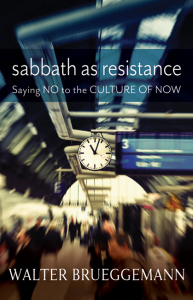Walter Brueggemann: Sabbath as Resistance
 Walter Brueggemann, Sabbath as Resistance: Saying No to the Culture of Now (Louisville, KY: Westminster John Knox, 2014), 89 pages, ISBN 9780664239282.
Walter Brueggemann, Sabbath as Resistance: Saying No to the Culture of Now (Louisville, KY: Westminster John Knox, 2014), 89 pages, ISBN 9780664239282.
Walter Brueggemann delivers another of his thought provoking works (in the vein of The Prophetic Imagination and its various spin-offs) intended to provide a positive framework and application of the Sabbath for the Church. Brueggemann offers a simple proposal to move from a negative appropriation of Sabbath (what one does not do) to a positive appropriation (following such works as Marva Dawn’s Keeping the Sabbath Wholly: Ceasing, Resting, Embracing, Fasting and Abraham Heschel’s classic The Sabbath: Its Meaning for Modern Man). The negative approach has long dominated the Protestant worldview with images of Puritanical laws enforced by draconian measures.
However, Brueggemann attempts to offer here a vista of Sabbath as “an affirmative declaration of faith and identity” (x). He frames his proposal between discussions of the relation of Sabbath to the first and tenth commandments in order to locate Sabbath within the life of Israel in faithful relationship with Yahweh and neighbor (following the lead of Patrick Miller’s The Ten Commandments in the Interpretation series, 1). Enclosed within this framework, he describes Sabbath specifically as resistance to anxiety (20-33), coercion (34-45), exclusivism (46-57), and multitasking (58-68). All of these belong to the tyranny of enslavement and disorder of life. The resistance of Sabbath is liberation from the domination of these taskmasters and a movement into the land of promise with its hope of life and blessing, fruitfulness and ultimate rest.
His premise is that restlessness is pervasive in our current context in typological likeness to the restlessness of Israel in bondage. The Pharaonic taskmasters rule our time and energy, but Yahweh says, “Let my people go!” and gives freedom to the captives and recreates society around restfulness. “Sabbath-keeping is a way of making a statement of peculiar identity amid a larger public identity, of maintaining and enacting a counter-identity that refuses ‘mainstream’ identity, which itself entails anti-human practice and the worship of anti-human gods. [Thus]…Sabbath is a bodily act of testimony to alternative and resistance to pervading values and the assumptions behind those values.” (21) Sabbath reorients all of life to the reality of the God who created all, the God of Israel, God the Father, Son and Holy Spirit who is God alone. It also calls for the humanizing of humanity as made in the image of this God. In this way, Brueggemann argues essentially that Sabbath observance/remembering cannot be reduced to practices of a day. It is the reorientation of all of life toward resting in the Deliverer’s faithful provision and ultimate claims upon us as Lord.
Category: Living the Faith, Spring 2015


